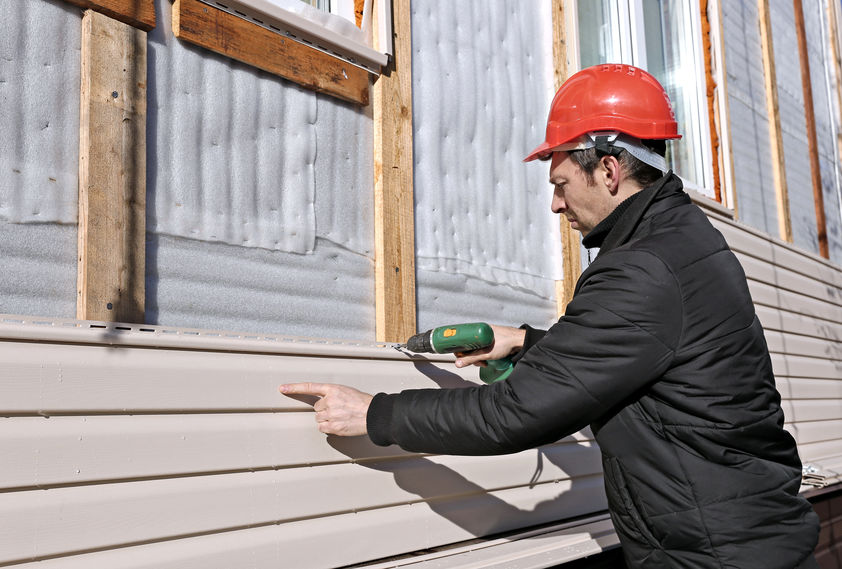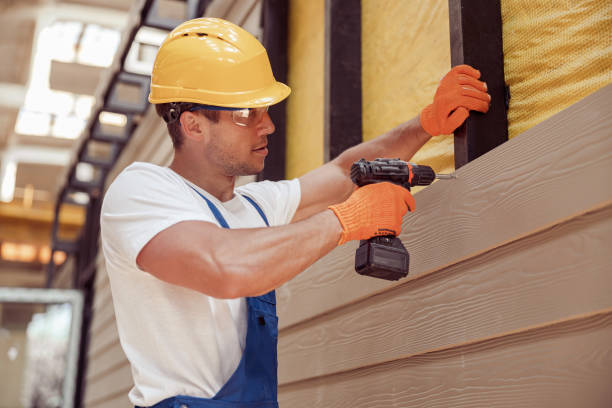Reliable Morris Siding Contractor Specializing in Residential Siding Projects
Reliable Morris Siding Contractor Specializing in Residential Siding Projects
Blog Article
The Essential Overview to the Different Kinds Of House Siding and Their Special Advantages
In the world of home improvement, selecting the right exterior siding is a vital choice that affects both aesthetic allure and useful efficiency. With so several alternatives to take into consideration, which house siding product absolutely stands out for your certain job?
Wood Exterior Siding
Timber home siding, a prominent choice for domestic exteriors, supplies a classic aesthetic that combines all-natural elegance with architectural stability. This exterior siding material is offered in different styles, consisting of clapboard, tiles, and board-and-batten, enabling house owners to personalize their façade to match their layout choices. Wood siding is generally crafted from durable varieties such as cedar, redwood, or pine, which are known for their strength and ability to hold up against ecological stressors.
Among the main advantages of wood exterior siding is its excellent insulation properties, which can add to energy performance and lower home heating expenses. Additionally, timber exterior siding is eco-friendly, making it an eco-friendly option when sourced sustainably. Normal upkeep, including paint or staining, can extend its lifespan and improve its look, permitting home owners to preserve the natural beauty of the wood.
Nevertheless, possible drawbacks include sensitivity to insects, rot, and weather condition damages, necessitating appropriate treatment and upkeep - morris siding contractor. Despite these issues, when effectively cared for, wood house siding can give a attractive and resilient service that improves the character of a home while using a cozy, welcoming atmosphere

Plastic Siding
Plastic home siding has become a leading option for homeowners looking for a low-maintenance exterior option that integrates sturdiness and affordability. This flexible material is crafted from polyvinyl chloride (PVC), making it resistant to numerous weather, including dampness and UV rays. Therefore, plastic siding does not warp, rot, or fade, making certain lasting visual appeal.
Among the key benefits of vinyl house siding is its comprehensive array of colors and styles, enabling house owners to accomplish the wanted search for their building without the demand for constant repainting. In addition, vinyl house siding is easy to install, which can dramatically lower labor prices during building or restoration tasks.
Vinyl home siding additionally adds to power efficiency. Many choices function insulation support, which improves thermal efficiency, helping to preserve comfortable interior temperature levels and possibly reducing power expenses. Its smooth surface facilitates very easy cleaning, requiring only periodic cleaning with a yard pipe to get rid of dirt and debris.
Fiber Cement Exterior Siding
Fiber cement siding has actually obtained grip amongst builders and home owners alike as a result of its impressive mix of resilience and aesthetic flexibility. Made up of a mix of sand, concrete, and cellulose fibers, this home siding option is crafted to hold up against severe weather, including high winds, heavy rainfall, and temperature fluctuations, making it a durable option for residential exteriors.
Among the primary advantages of fiber cement home siding is its resistance to insects, such as termites, and its non-combustible nature, offering improved fire safety. morris siding contractor. In addition, it is readily available in a large selection of colors, appearances, and styles, allowing homeowners to accomplish their wanted visual without sacrificing efficiency
An additional benefit is its reduced maintenance demands; fiber concrete house siding generally needs painting or staining every 5-10 years, which is less regular than various other products. Furthermore, its durability adds to a reduced total cost of possession, as it reduces the need for regular fixings or substitutes.
Inevitably, fiber concrete siding represents an outstanding investment for those looking for a durable, appealing, and functional outside alternative, incorporating both kind and function to enhance the home's visual allure.
Metal Exterior Siding
The appeal of metal home siding hinges on its robust longevity and modern-day visual appeal, making it a preferred choice for contemporary style. Readily available in products such as light weight aluminum and steel, metal siding provides a variety of coatings and shades, allowing home owners to accomplish a tailored appearance that matches their design vision.

Energy efficiency is one more considerable advantage, as numerous metal exterior siding items are created with insulation choices that assist control indoor temperatures. This can result in decreased energy expenses in time. Furthermore, metal siding is commonly recyclable, making it an eco-friendly option for sustainability-minded property owners.
The setup procedure for metal siding can be reasonably uncomplicated, causing a quicker turnaround time for building projects. Overall, steel home siding incorporates performance and style, making it a sensible choice for those looking for a visually appealing and long-lasting exterior finish.
Block and Rock Home Siding
Brick and rock home siding sticks out as an ageless choice that boosts the aesthetic beauty of any type of home. Known for their durability and reduced maintenance, these products offer an outstanding roi while elevating the home's curb charm. Available in different shades, structures, and patterns, block and stone can be customized to fit varied architectural designs, from conventional to contemporary.
One of the key benefits of block and rock exterior siding is their power efficiency. Both materials have all-natural insulating residential or commercial properties that assist regulate indoor temperatures, possibly minimizing cooling and heating expenses. Furthermore, they provide premium fire resistance contrasted to other exterior siding choices, adding to enhanced safety.
Another benefit is their durability. Brick and rock can last for years, frequently needing very little maintenance past occasional cleaning. Unlike wood exterior siding, they are invulnerable to bugs and rot, making certain a durable outside that holds up against the elements.
Final Thought
In article summary, the selection of exterior siding substantially affects a home's aesthetic charm, energy effectiveness, and maintenance demands. Each sort of exterior siding-- whether wood, vinyl, fiber imp source steel, block, or concrete and rock-- uses special advantages tailored to various house owner preferences and environmental problems. Recognizing these choices allows informed choices that boost both the resilience and aesthetic beauty of domestic exteriors. Inevitably, picking the best exterior siding is important for attaining an equilibrium between performance and style in domestic architecture.
One of the primary advantages of wood siding is its superb insulation properties, which can add to power performance and lower heating prices. Furthermore, timber exterior siding is eco-friendly, making it an environmentally pleasant choice when sourced sustainably.One of the key benefits of metal house siding is its resistance to various environmental variables.Energy efficiency is one more considerable benefit, as many metal home siding items are designed with insulation choices that assist manage interior temperature levels. Each kind of siding-- whether wood, vinyl, fiber steel, concrete, or block additional hints and stone-- provides special advantages customized to various property owner preferences and environmental conditions.
Report this page